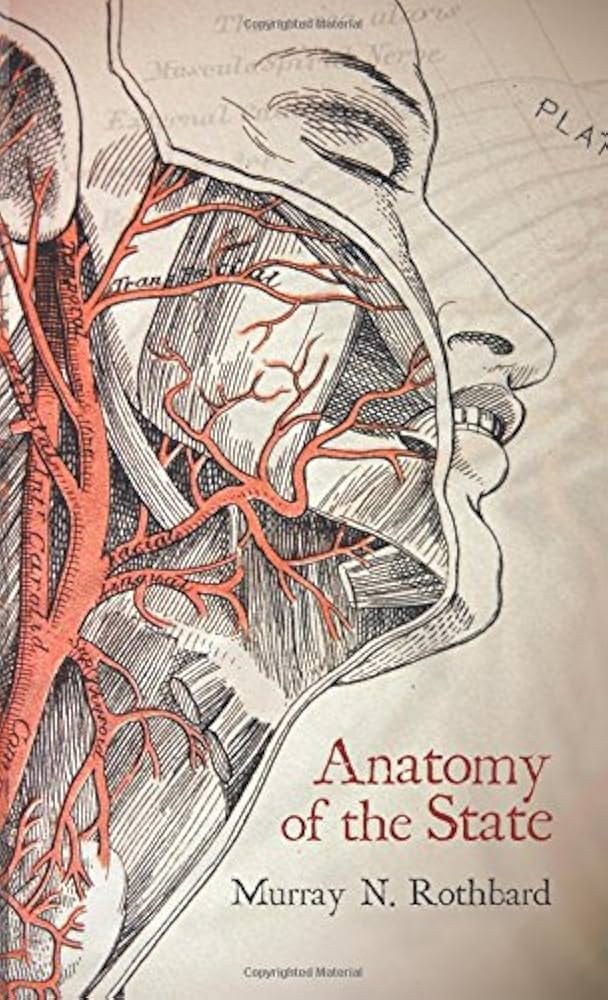Anatomy of the State by Murray N. Rothbard
Since its expansion necessarily involves ever-greater incursions on private individuals and private enterprise, we must assert that the State is profoundly and inherently anticapitalist.
Thanks, Adam, for maintaining a blog with consistently great recommendations whenever your rating is above 7/10. You consistently find books that are bang for buck: dense, rooted in first principles, and filled with illustrative examples.
In Anatomy of the State Murray N. Rothbard argues that the State is inherently a coercive entity, sustaining itself through force and ideological manipulation rather than genuinely representing the will of the people. He outlines how the State preserves and expands its power at the expense of social and economic freedoms, framing itself in opposition to pure capitalism, which he sees as a social good driven by mutually beneficial exchanges. However, history shows that unchecked capitalism can be just as exploitative, as evidenced by the brutal excesses of industrialization.
Through my own research, I’ve arrived at many of the same conclusions as Rothbard, cultivating a healthy distrust of unchecked power and its ability to spiral out of control—whether in the form of a bloated state bureaucracy, the rapacious nature of unrestrained industry, or the dangers of a leftist social justice movement driven by resentment from colonialism. To prevent such extremes, there must be checks and balances between the state, private capital (markets), and individuals exercising their rights.
Visionary leaders like Lee Kuan Yew and Deng Xiaoping managed to transcend factionalism, economic self-interest, and absolute notions of freedom, using each element in the right measure to build societies that far surpassed their origins. This nuanced use of power contrasts sharply with the value capture often practiced by figures like LBJ and Robert Moses, as detailed in Robert Caro’s life work, which reveals the nature of political power in 20th-century America. In contrast, Henry Kissinger's Leadership examines leaders who adeptly harnessed state power to create real societal progress, showcasing a rare but essential alignment of governance and genuine public benefit.
Outline:
I played around with using an PDF reader LLM extension to generate 3 quotes to illustrate the main point of each chapter. I thought it did quite well:
Introduction
Main Point: The State is often misidentified as a necessary social institution, rather than a coercive entity.
"The greatest danger to the State is independent intellectual criticism."
"The State cannot be perceived as a mere collective of people working toward common good."
"It is crucial to define what the State is and what it is not."
What the State Is Not
Main Point: The State is erroneously viewed as a representative of society and the public will”
If 'we are the government,' then anything a government does to an individual is... 'voluntary' on the part of the individual concerned."
“This ideological camouflage obscures the reality of political life."
"Government actions are not collective decisions but rather coercive impositions."
What the State Is
Main Point: The State maintains a monopoly on coercion and force within a defined territory.
"The State is that organization in society which attempts to maintain a monopoly of the use of force and violence."
"Unlike other institutions, the State obtains its revenue through coercion."
"It is the only entity that uses and threatens violence to sustain itself."
How the State Preserves Itself
Main Point: The State relies on the ideological support of its citizens to maintain control.
"The chief task of the rulers is always to secure the active or resigned acceptance of the majority of the citizens."
"Intellectuals play a vital role in shaping public opinion."
"Ideology is a critical tool to garner support and maintain legitimacy."
How the State Transcends Its Limits
Main Point: The State continuously extends its power despite efforts to check it.
"Every single such theory has... lost its original purpose, and come to act merely as a springboard to Power."
"The concept of parliamentary democracy has been transformed into a tool for greater central authority."
"Many checks have been turned into legitimizing devices for State actions."
What the State Fears
Main Point: The State fears threats to its power and existence, such as revolutions or external wars.
"The death of a State can come about in two major ways: (a) through conquest by another State, or (b) through revolutionary overthrow by its own subjects."
"War enhances State power under the guise of national security."
"The State must rally public support to maintain its rule during crises."
How States Relate to One Another
Main Point: States naturally compete for power and territory, leading to conflicts.
"The natural tendency of a State is to expand its power through conquest."
"Only one set of rulers can obtain a monopoly of coercion over any given territorial area at any one time."
"Inter-State relations are marked by a constant threat of war."
History as a Race Between State Power and Social Power
Main Point: The struggle between productive social power and predatory State power shapes human history.
"The history of mankind, particularly its economic history, may be considered as a contest between... creative productivity and coercive exploitation."
"Social power is man’s cooperative transformation of nature’s resources."
“State power is the coercive seizure of the fruits of society for the benefit of rulers."
Conclusion
Main Point: Historical attempts to limit State power have failed, requiring new approaches.
"The problem of the State is evidently as far from solution as ever."
"None of the numerous forms of government has succeeded in restraining State power.”
"The creation of independent centers of intellectual inquiry must become a priority."





Who’s Adam?